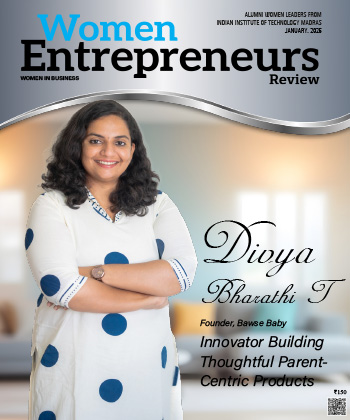
78% Women in Tech See AI as Key to Equal Opportunity: Report
By: WE staff | Saturday, 13 September 2025
- Most of the women in the tech industry see AI as a major force behind equal opportunity
- 78% of interviewees are convinced that AI can enable them to get more and sought-after job opportunities
Most women who are employed in the technology industry regard AI as a major force of equal opportunity, with 78 percent affirming it has the potential to allow them to get better and sought-after job opportunities, a report by careers and jobs platform apna.co says.
This is based on feedback from more than 11,300 women in the tech industry in India.
The report also sees a trend towards workplace equality, with 52 percent of the respondents being Gen Z (below 25 years), close to 60 percent belonging to tier II-III cities, and two-thirds having attended non-prestige colleges.
It also uncovered the fact that 58 percent of women are already engaged in AI/ML training via work, formal education, or self-study, while another 24 percent intend to begin soon.
The desire to be ready for an AI-driven future was highest among Gen Z respondents (62 percent) and tier II-III non-elite colleges (70 percent).
Almost half of the participants plan to be AI software developers, followed by 19 percent who plan for data science and ML, 14 percent for product management, and 10 percent planning for research. This shows a preference for industry-oriented, high-demand jobs.
Nirmit Parikh, co-founder and CEO of apna.co, said that women in technology are not only adopting AI as a trend, but also as a means to achieve equitable opportunity and many of them already use AI in their jobs or are actively learning it.
The study also discovered that 64 percent of women in tech now place more emphasis on AI skills than having graduated from a top college. This attitude was strongest among Gen Z (62 percent) and tier II-III city women (74 percent) over metro cities (66 percent).
In terms of challenges in pursuing AI opportunities, 42 percent of the respondents identified access to quality opportunities as the challenge, 27 percent cited the need for enhanced mentorship, and 19 percent cited the need for enhanced training options.
Most Viewed
- 1 Women's Health Startup HerMD Closing Doors Amid Industry Challenges
- 2 5 Famous Women in Indian Armed Forces
- 3 Saudi Women No longer Require Male Permission for Clothing Choices, says Prince MbS
- 4 Kolkata Medtech Startup Innovodigm Raises Rs 5.5 Crore Seed Funding Led by IAN Group
- 5 Yamunanagar's Kashish Kalra Honoured after Securing 111th Rank in UPSC Civil Services Exam
- 6 Madurai Appoints Its First Woman Corporation Head
- 7 IAS Vijayalakshmi Bidari Appointed as the new Nagpur Divisional Commissioner
- 8 American Entrepreneur Lucy Guo Overtakes T Swift to become Youngest Female Billionaire
- 9 ICC Women's World Cup 2025 Trophy Showcased at Indore's Holkar Stadium
- 10 Aparna Saxena's Beauty Venture AntiNorm Launches in India
- 11 Vidya Nataraj Co-Founded BlueStone Jewellery & Lifestyle files IPO
- 12 5 Women Freedom Fighters of India
- 13 Dr. G Krishnapriya appointed as CEO for Trichy
- 14 M3M & Sirona Partner to Introduce Menstrual Hygiene Vending Machines in 15 Locations
- 15 Punjab Govt launches SHE Cohort 3.0 Supporting Tech-led Women Startups
- 16 Indian origin Lawyer, Sweena Pannu appointed as the US New Superior Court Judge
- 17 The Aurora Tech Award recognizes 4 Indian Women-led Startups
- 18 Kerala's Republic Day parade featured an all-female tableau
- 19 Manisha Kabbur Becomes Karnataka's First Woman International Karate Coach
- 20 Director K. S. Ravikumar's Daughter Maalica Ravikumar Launches Life Coaching Company 'Evergrowth Academy' for Women
- 21 Leezu's Raises Pre-Seed Funding to Accelerate Growth in Sexual Wellness Industry
- 22 Sattu: Super-easy summer drink for PCOS gut healing
- 23 Swathi Nelabhatla creates Sitha App, India's First Women-Exclusive Gig Platform
- 24 7 Timeless Female Kathak Dancers & their Iconic Legacies
- 25 Meet 7 Iconic Women Architects of Modern India & their Most Impactful Work
- 26 This Woman-led Insuretech Startup is Helping Bridge the Education Financing Gap in India
- 27 Women Leaders Share Lessons Learnt from India Women's WC Win
- 28 5 Enterprising Women Founders Powering Singapore's Tech & Innovation Landscape
- 29 4 Women. 4 Stories. One Vision for Smarter, Stronger Healthcare
- 30 Global Gender Gap Narrows to 68.8%, But Full Equality 123 Years Away: WEF Report 2025
- 31 Changemakers: 7 Women Entrepreneurs Taking the Make in India Movement Forward
- 32 Meet Lucy Guo, The Youngest Self-Made Female Billionaire Disrupting Tech
- 33 How Women are Driving India's Festive Online Shopping Surge






